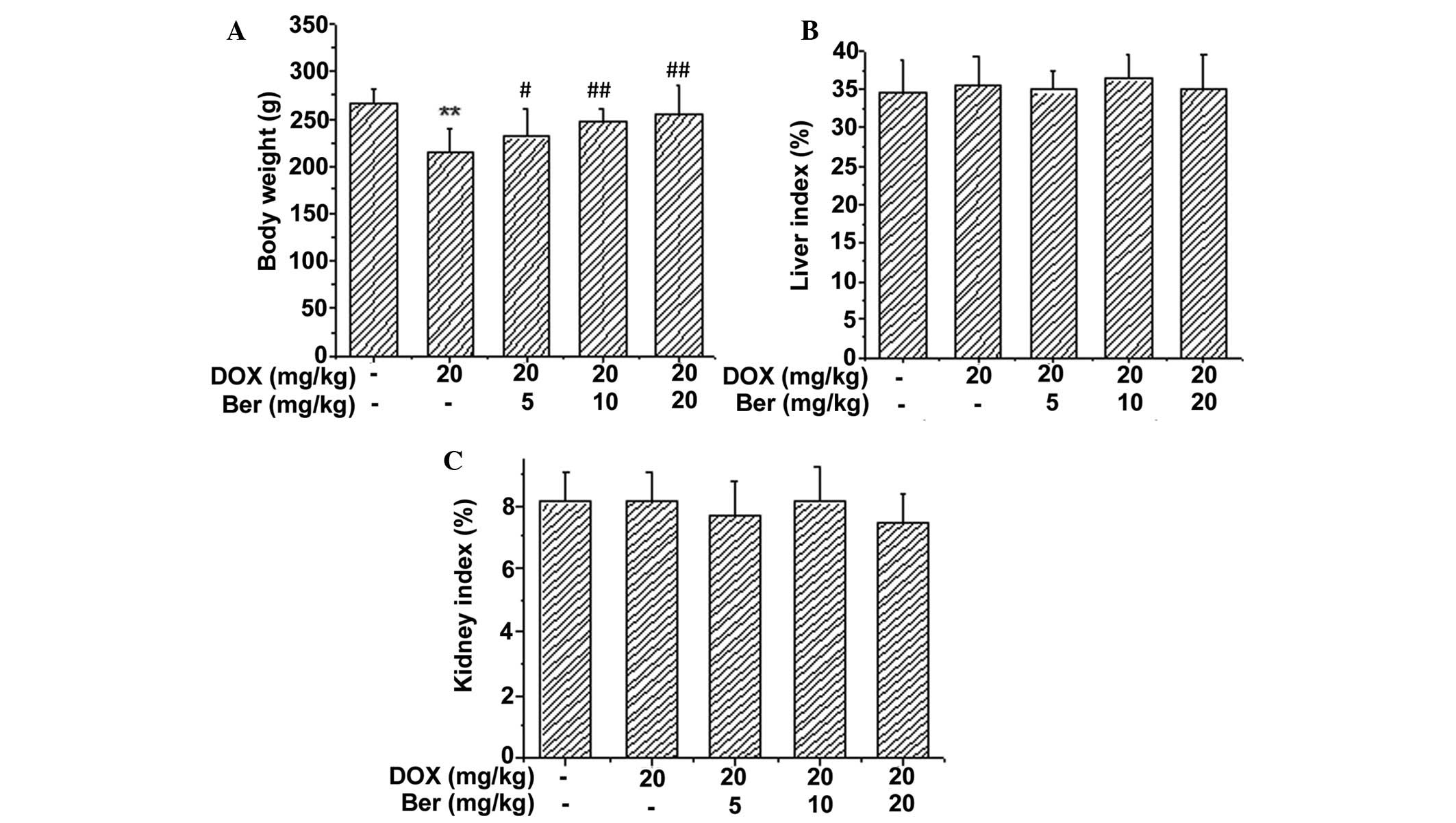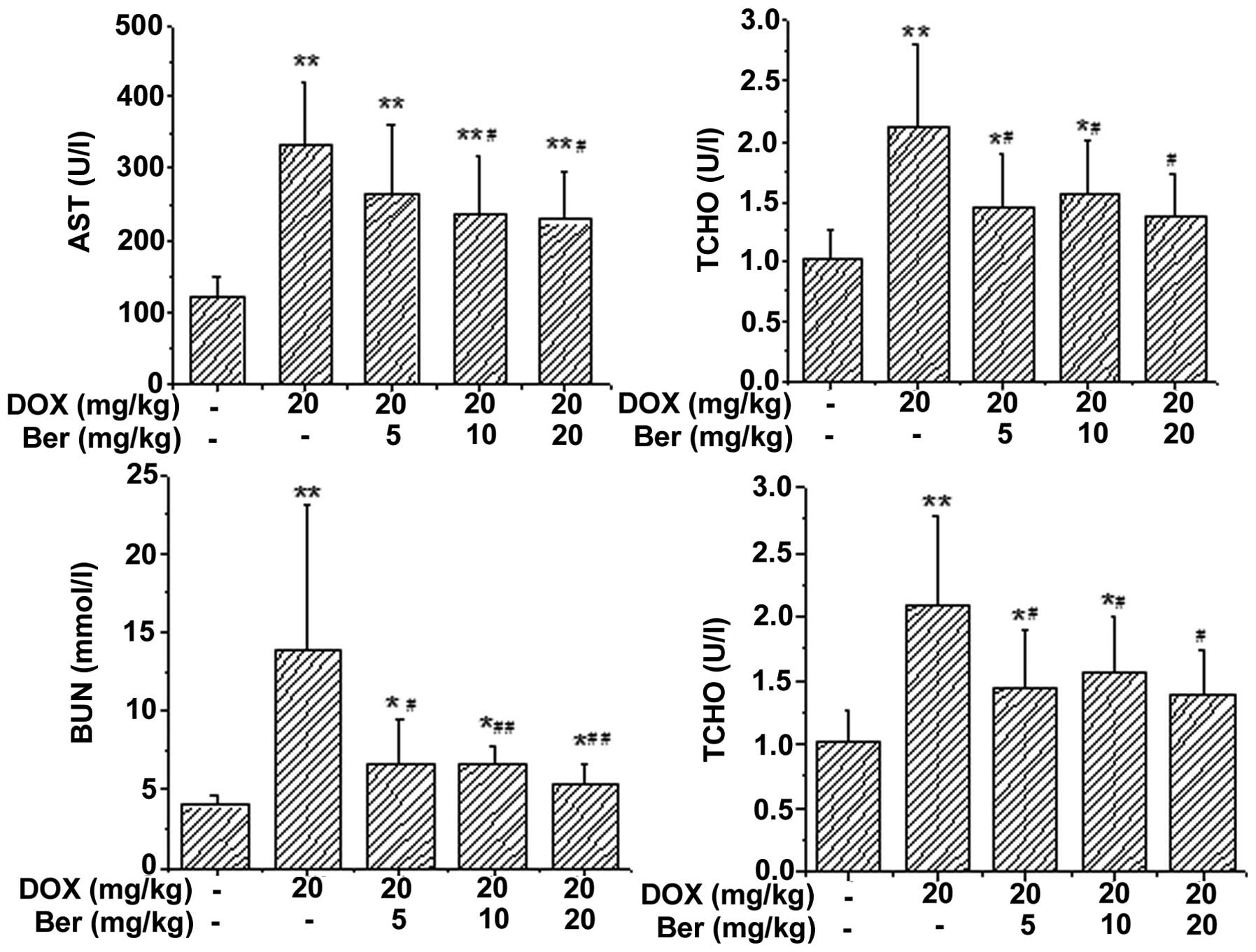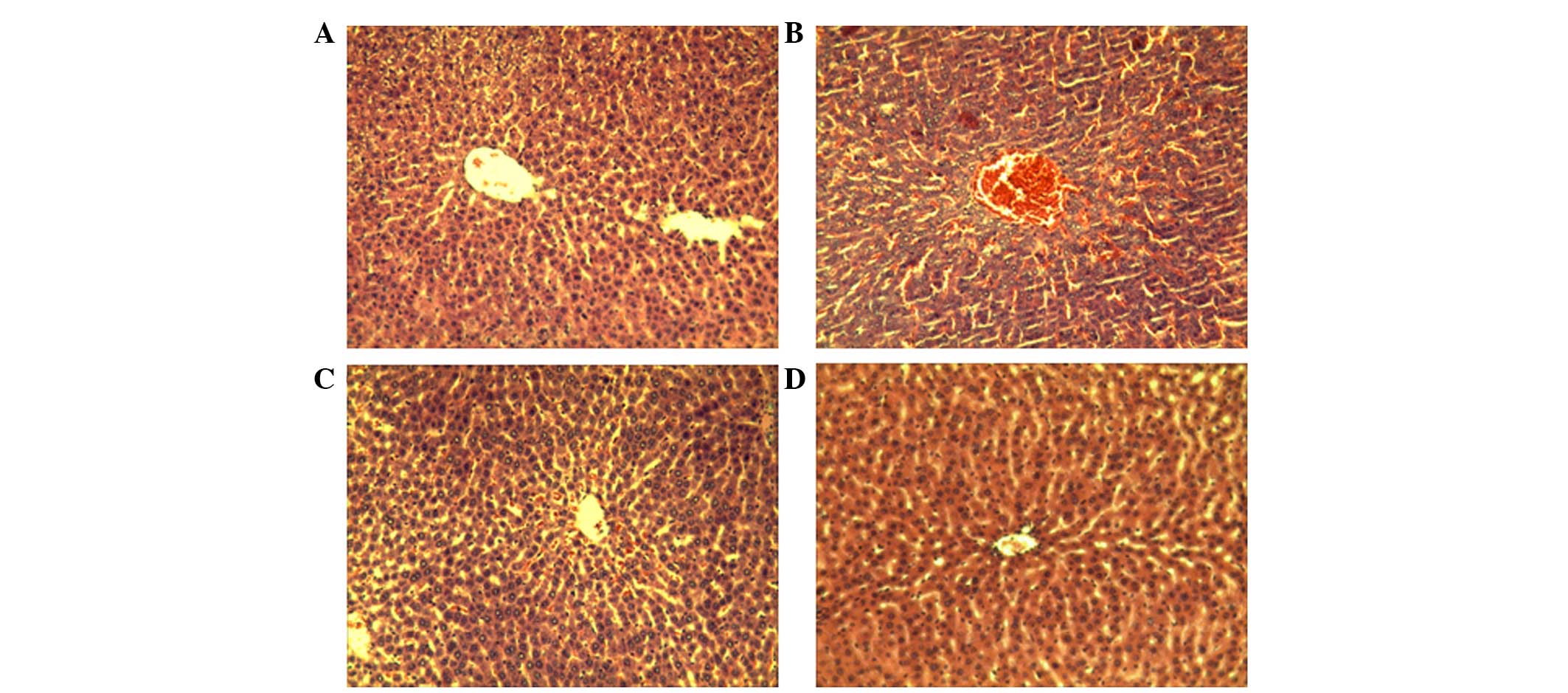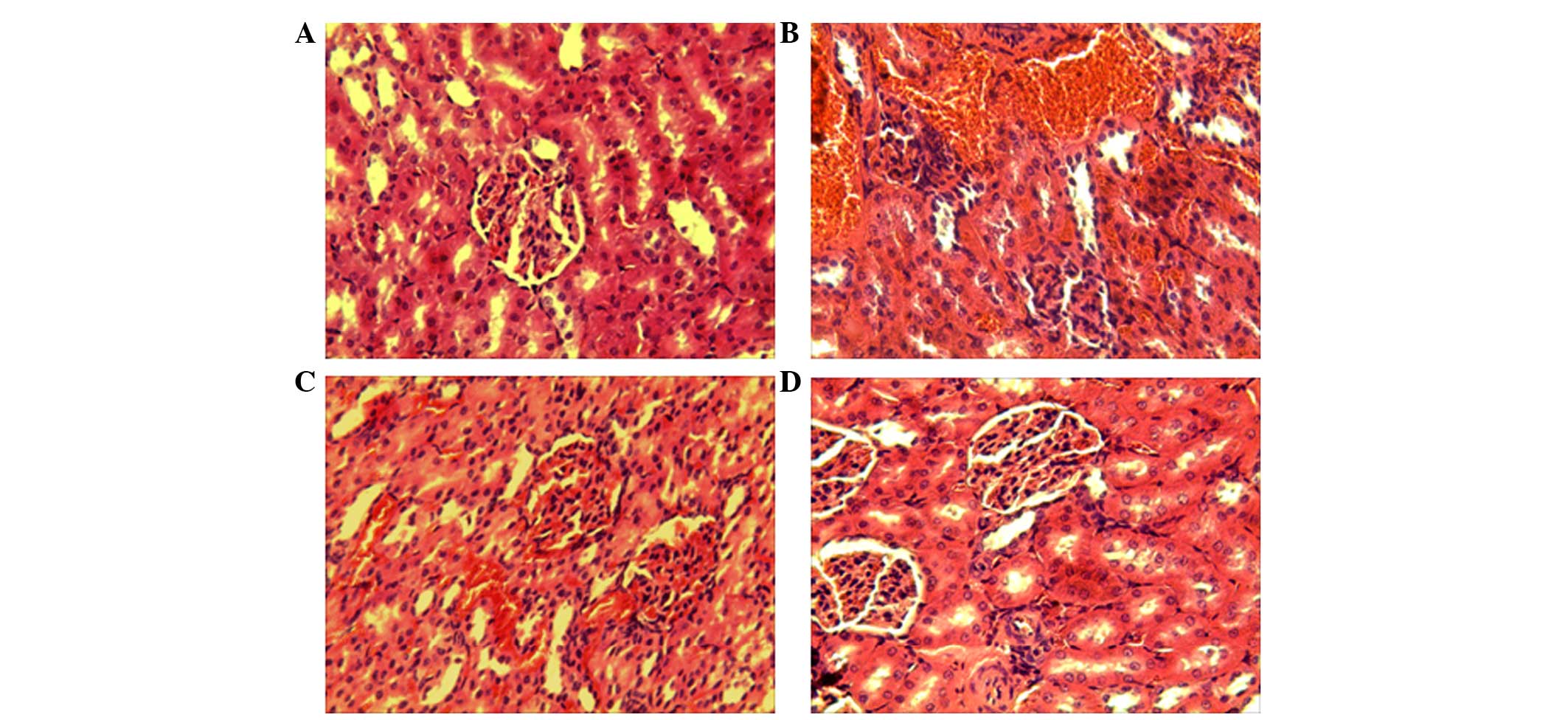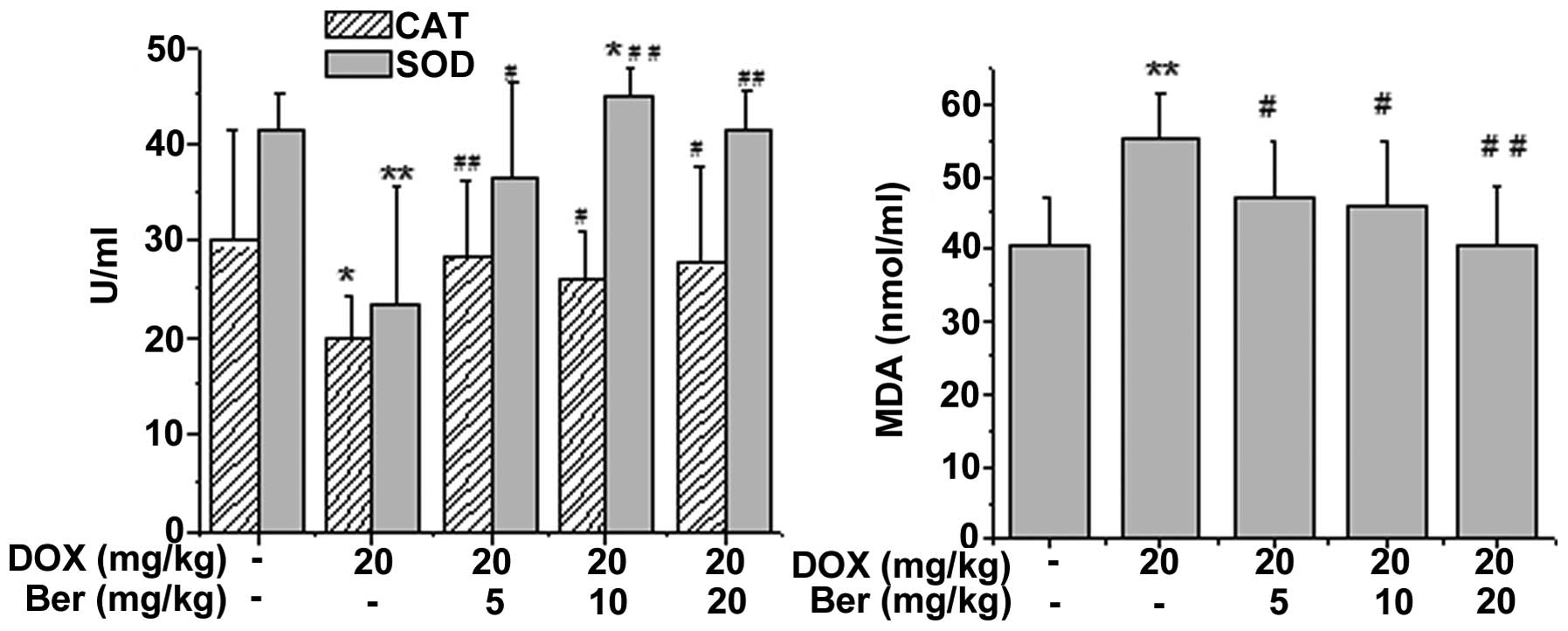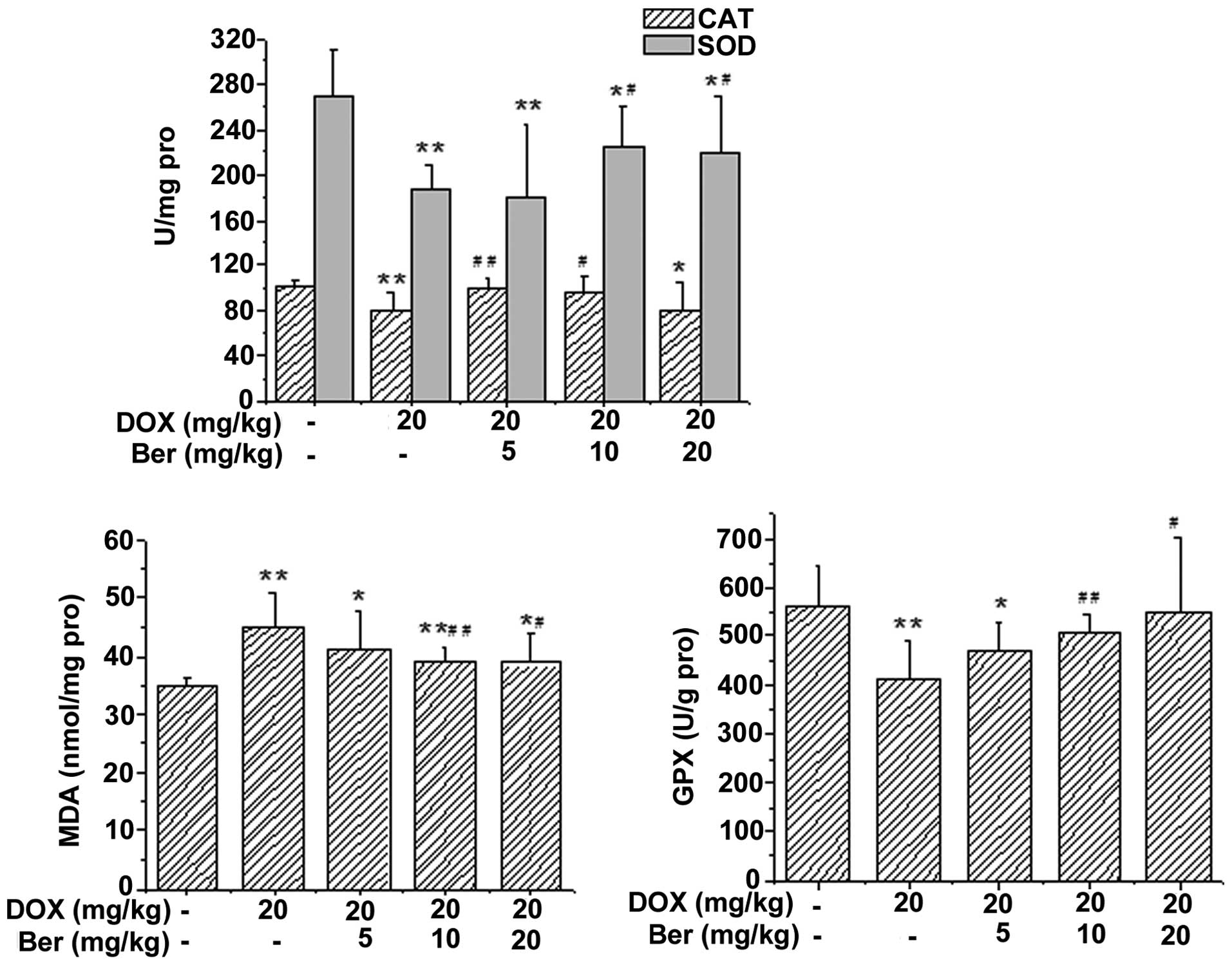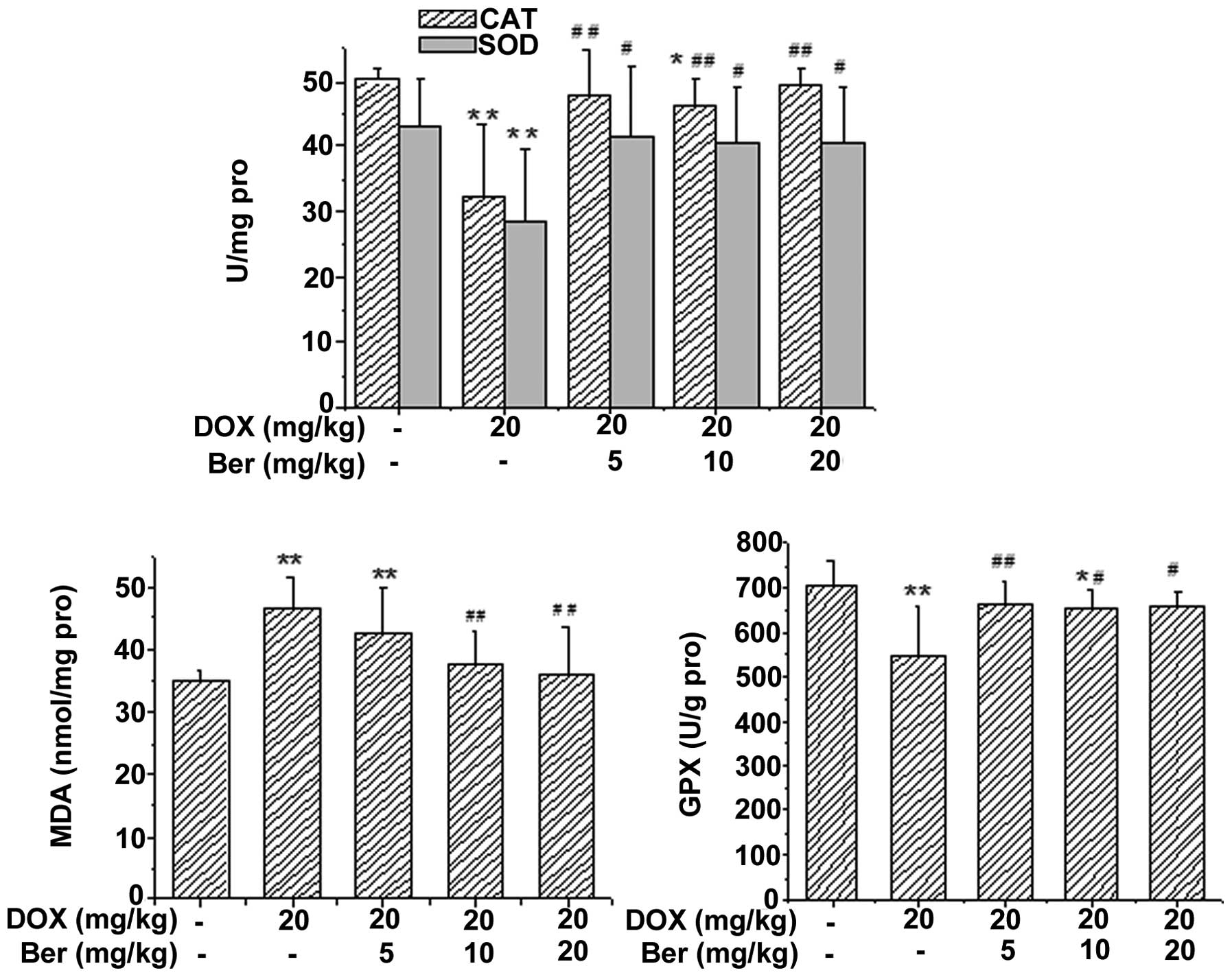|
1
|
Cheng C, Xue W, Diao H, Xia S, Zuo L, He
A, Gao F, Huang Z, Chen J and Zhang J: Antitumor activity and
toxicological properties of doxorubicin conjugated to [alpha],
[beta]-poly [(2-hydroxyethyl)-L-aspartamide] administered
intraperitoneally in mice. Anticancer Drugs. 21:362–371. 2010.
View Article : Google Scholar : PubMed/NCBI
|
|
2
|
Tangpong J, Miriyala S, Noel T,
Sinthupibulyakit C, Jungsuwadee P and St Clair DK:
Doxorubicin-induced central nervous system toxicity and protection
by xanthone derivative of Garcinia mangostana. Neuroscience.
175:292–299. 2011. View Article : Google Scholar :
|
|
3
|
Cardoso S, Santos RX, Carvalho C, Correia
S, Pereira GC, Pereira SS, Oliveira PJ, Santos MS, Proença T and
Moreira PI: Doxorubicin increases the susceptibility of brain
mitochondria to Ca(2+)-induced permeability transition and
oxidative damage. Free Radic Biol Med. 45:1395–1402. 2008.
View Article : Google Scholar : PubMed/NCBI
|
|
4
|
Kalender Y, Yel M and Kalender S:
Doxorubicin hepatotoxicity and hepatic free radical metabolism in
rats. The effects of vitamin E and catechin. Toxicology. 209:39–45.
2005. View Article : Google Scholar : PubMed/NCBI
|
|
5
|
Bárdi E, Bobok I, Voláh A, Kappelmayer J
and Kiss C: Anthracycline antibiotics induce acute renal tubular
toxicity in children with cancer. Pathol Oncol Res. 13:249–253.
2007. View Article : Google Scholar : PubMed/NCBI
|
|
6
|
Yang XL, Fan CH and Zhu HS: Photo-induced
cytotoxicity of malonic acid [C(60)]fullerene derivatives and its
mechanism. Toxicol In Vitro. 16:41–46. 2002. View Article : Google Scholar : PubMed/NCBI
|
|
7
|
Badkoobeh P, Parivar K, Kalantar SM,
Hosseini SD and Salabat A: Effect of nano-zinc oxide on
doxorubicin-induced oxidative stress and sperm disorders in adult
male Wistar rats. Iran J Reprod Med. 11:355–364. 2013.
|
|
8
|
Li L, Takemura G, Li Y, Miyata S, Esaki M,
Okada H, Kanamori H, Khai NC, Maruyama R, Ogino A, et al:
Preventive effect of erythropoietin on cardiac dysfunction in
doxorubicin-induced cardiomyopathy. Circulation. 113:535–543. 2006.
View Article : Google Scholar : PubMed/NCBI
|
|
9
|
Yeh YC, Lai HC, Ting CT, Lee WL, Wang LC,
Wang KY, Lai HC and Liu TJ: Protection by doxycycline against
doxorubicin-induced oxidative stress and apoptosis in mouse testes.
Biochem Pharmacol. 74:969–980. 2007. View Article : Google Scholar : PubMed/NCBI
|
|
10
|
Tang LQ, Wang FL, Zhu LN, Lv F, Liu S and
Zhang ST: Berberine ameliorates renal injury by regulating G
proteins-AC- cAMP signaling in diabetic rats with nephropathy. Mol
Biol Rep. 40:3913–3923. 2013. View Article : Google Scholar
|
|
11
|
Wang Y, Huang Y, Lam KS, Li Y, Wong WT, Ye
H, Lau CW, Vanhoutte PM and Xu A: Berberine prevents
hyperglycemia-induced endothelial injury and enhances
vasodilatation via adenosine monophosphate-activated protein kinase
and endothelial nitric oxide synthase. Cardiovasc Res. 82:484–492.
2009. View Article : Google Scholar : PubMed/NCBI
|
|
12
|
Derosa G, Maffioli P and Cicero AF:
Berberine on metabolic and cardiovascular risk factors: An analysis
from preclinical evidences to clinical trials. Expert Opin Biol
Ther. 12:1113–1124. 2012. View Article : Google Scholar : PubMed/NCBI
|
|
13
|
Cho BJ, Im EK, Kwon JH, Lee KH, Shin HJ,
Oh J, Kang SM, Chung JH and Jang Y: Berberine inhibits the
production of lysophosphatidylcholine-induced reactive oxygen
species and the ERK1 2 pathway in vascular smooth muscle cells. Mol
Cells. 20:429–434. 2005.
|
|
14
|
Li J, Pan Y, Kan M, Xiao X, Wang Y, Guan
F, Zhang X and Chen L: Hepatoprotective effects of berberine on
liver fibrosis via activation of AMP-activated protein kinase. Life
Sci. 98:24–30. 2014. View Article : Google Scholar : PubMed/NCBI
|
|
15
|
Hsu YY, Tseng YT and Lo YC: Berberine, a
natural antidiabetes drug, attenuates glucose neurotoxicity and
promotes Nrf2-related neurite outgrowth. Toxicol Appl Pharmacol.
272:787–796. 2013. View Article : Google Scholar : PubMed/NCBI
|
|
16
|
Marin-Neto JA, Maciel BC, Secches AL and
Gallo Junior L: Cardiovascular effects of berberine in patients
with severe congestive heart failure. Clin Cardiol. 11:253–260.
1988. View Article : Google Scholar : PubMed/NCBI
|
|
17
|
Zhao X, Zhang J, Tong N, Liao X, Wang E,
Li Z, Luo Y and Zuo H: Berberine attenuates doxorubicin-induced
cardiotoxicity in mice. J Int Med Res. 39:1720–1727. 2011.
View Article : Google Scholar : PubMed/NCBI
|
|
18
|
Kelishomi RB, Ejtemaeemehr S, Tavangar SM,
Rahimian R, Mobarakeh JI and Dehpour AR: Morphine is protective
against doxorubicin-induced cardiotoxicity in rat. Toxicology.
243:96–104. 2008. View Article : Google Scholar
|
|
19
|
Jing L, Wu Y, Wu J, Zhao J, Zuo D and Peng
S: Peroxiredoxins are involved in metallothionein protection from
doxorubicin cardiotoxicity. Eur J Pharmacol. 659:224–232. 2011.
View Article : Google Scholar : PubMed/NCBI
|
|
20
|
Hou XW, Jiang Y, Wang LF, Xu HY, Lin HM,
He XY, He JJ and Zhang S: Protective role of granulocyte
colony-stimulating factor against adriamycin induced cardiac, renal
and hepatic toxicities. Toxicol Lett. 187:40–44. 2009. View Article : Google Scholar : PubMed/NCBI
|
|
21
|
You JS, Pan TL and Lee YS: Protective
effects of Danshen (Salvia miltiorrhiza) on adriamycin-induced
cardiac and hepatic toxicity in rats. Phytother Res. 21:1146–1152.
2007. View
Article : Google Scholar : PubMed/NCBI
|
|
22
|
Outomuro D, Grana DR, Azzato F and Milei
J: Adriamycin-induced myocardial toxicity: New solutions for an ole
problems? Int J Cardiol. 117:6–15. 2007. View Article : Google Scholar
|
|
23
|
Piscitelli SC, Rodvold KA, Rushing DA and
Tewksbury DA: Pharmacokinetics and pharmacodynamics of doxorubicin
in patients with small-cell lung cancer. Clin Pharmacol Ther.
53:555–561. 1993. View Article : Google Scholar : PubMed/NCBI
|
|
24
|
Swain SM, Whaley FS and Ewer MS:
Congestive heart failure in patients treated with doxorubicin: A
retrospective analysis of three trials. Cancer. 97:2869–2879. 2003.
View Article : Google Scholar : PubMed/NCBI
|
|
25
|
King SL, Mohiuddin JJ and Dekaney CM:
Paneth cells expand from newly created and preexisting cells during
repair after doxorubicin-induced damage. Am J Physiol Gastrointest
Liver Physiol. 305:G151–G162. 2013. View Article : Google Scholar : PubMed/NCBI
|
|
26
|
Tong N, Zhang J, Chen Y, Li Z, Luo Y, Zuo
H and Zhao X: Berberine sensitizes mutliple human cancer cells to
the anticancer effects of doxorubicin in vitro. Oncol Lett.
3:1263–1267. 2012.PubMed/NCBI
|
|
27
|
Abd El-Wahab AE, Ghareeb DA, Sarhan EE,
Abu-Serie MM and El Demellawy MA: In vitro biological assessment of
Berberis vulgaris and its active constituent, berberine:
Antioxidants, anti-acetylcholinesterase, anti-diabetic and
anticancer effects. BMC Complement Altern Med. 13:2182013.
View Article : Google Scholar : PubMed/NCBI
|
|
28
|
Yan K, Zhang C, Feng J, Hou L, Yan L, Zhou
Z, Liu Z, Liu C, Fan Y, Zheng B and Xu Z: Induction of G1 cell
cycle arrest and apoptosis by berberine in bladder cancer cells.
Eur J Pharmacol. 661:1–7. 2011. View Article : Google Scholar : PubMed/NCBI
|
|
29
|
Youn MJ, So HS, Cho HJ, Kim HJ, Kim Y, Lee
JH, Sohn JS, Kim YK, Chung SY and Park R: Berberine, a natural
product, combined with cisplatin enhanced apoptosis through a
mitochondria caspase-mediated pathway in HeLa cells. Biol Pharm
Bull. 31:789–795. 2008. View Article : Google Scholar : PubMed/NCBI
|
|
30
|
Hsu YY, Chen CS, Wu SN, Jong YJ and Lo YC:
Berberine activates Nrf2 nuclear translocation and protects against
oxidative damage via a phosphatidylinositol 3-kinase Akt-dependent
mechanism in NSC34 motor neuron-like cells. Eur J Pharm Sci.
46:415–425. 2012. View Article : Google Scholar : PubMed/NCBI
|
|
31
|
Lv XX, Yu XH, Wang HD, Yan YX, Wang YP, Lu
DX, Qi RB, Hu CF and Li HM: Berberine inhibits
norepinephrine-induced apoptosis in neonatal rat cardiomyocytes via
inhibiting ROS-TNF-α-caspase signaling pathway. Chin J Integr Med.
19:424–431. 2013. View Article : Google Scholar
|
|
32
|
Cheng F, Wang Y, Li J, Su C, Wu F, Xia WH,
Yang Z, Yu BB, Qiu YX and Tao J: Berberine improves endothelial
function by reducing endothelial microparticles-mediated oxidative
stress in humans. Int J Cardiol. 167:936–942. 2013. View Article : Google Scholar
|
|
33
|
Shen L and Ji HF: The mechanisms of
ROS-photogeneration by berberine, a natural isoquinoline alkaloid.
J Photochem Photobiol B. 99:154–156. 2010. View Article : Google Scholar : PubMed/NCBI
|
|
34
|
Zhao X, Zhang J, Tong N, Chen Y and Luo Y:
Protective effects of berberine on doxorubicin-induced
hepatotoxicity in mice. Biol Pharm Bull. 35:796–800. 2012.
View Article : Google Scholar : PubMed/NCBI
|















